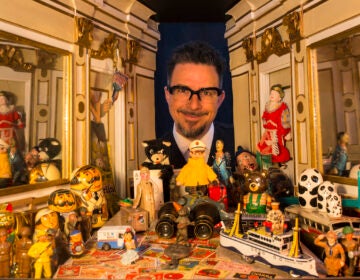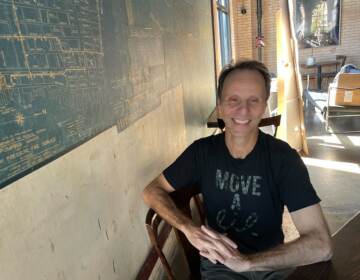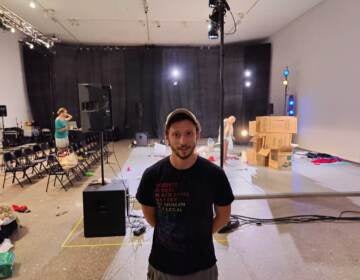In ‘Lions,’ Philadelphia artists turn the loss of their fathers into a bold new Fringe Festival production
Drawing from personal loss, Lightning Rod Special’s new work takes audiences through the chaos of end-of-life care, memory and legacy at the Philadelphia Fringe Festival.
Listen 8:03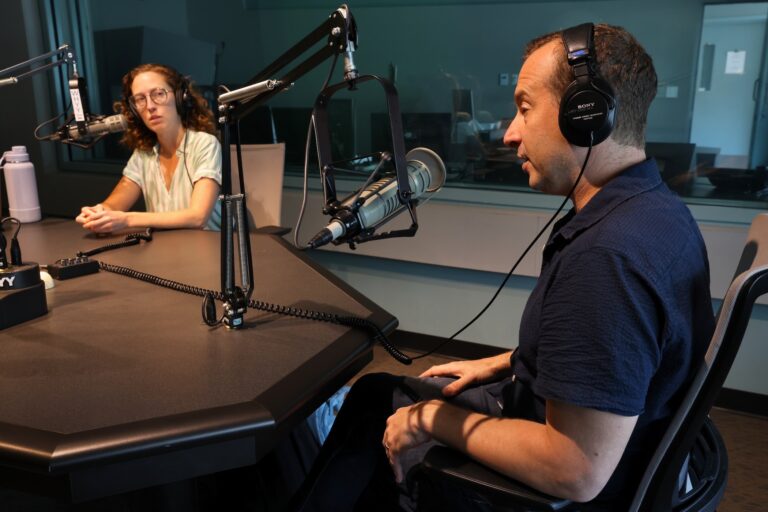
Jennifer Lynn with Alice Yorke and Scott Sheppard on "Lions" Fringe Show (Emma Lee/WHYY)
From Philly and the Pa. suburbs to South Jersey and Delaware, what would you like WHYY News to cover? Let us know!
“Lions,” a new theatrical production from the Philadelphia-based ensemble Lightning Rod Special, is now previewing at the Proscenium Theatre at the Drake as part of the 2025 Philadelphia Fringe Festival. Written and performed by Scott R. Sheppard and Alice Yorke, the play draws on personal experience through the loss of their fathers within the span of a year. The work explores the emotional and logistical complexities of end-of-life care while challenging cultural narratives surrounding masculinity and legacy.
In a recent interview with WHYY’s “Morning Edition,” host Jennifer Lynn spoke with Sheppard and Yorke about how their shared grief informed the creative process. They describe the play as an attempt to “disassemble the myths” their fathers held regarding what it means to be a great man.
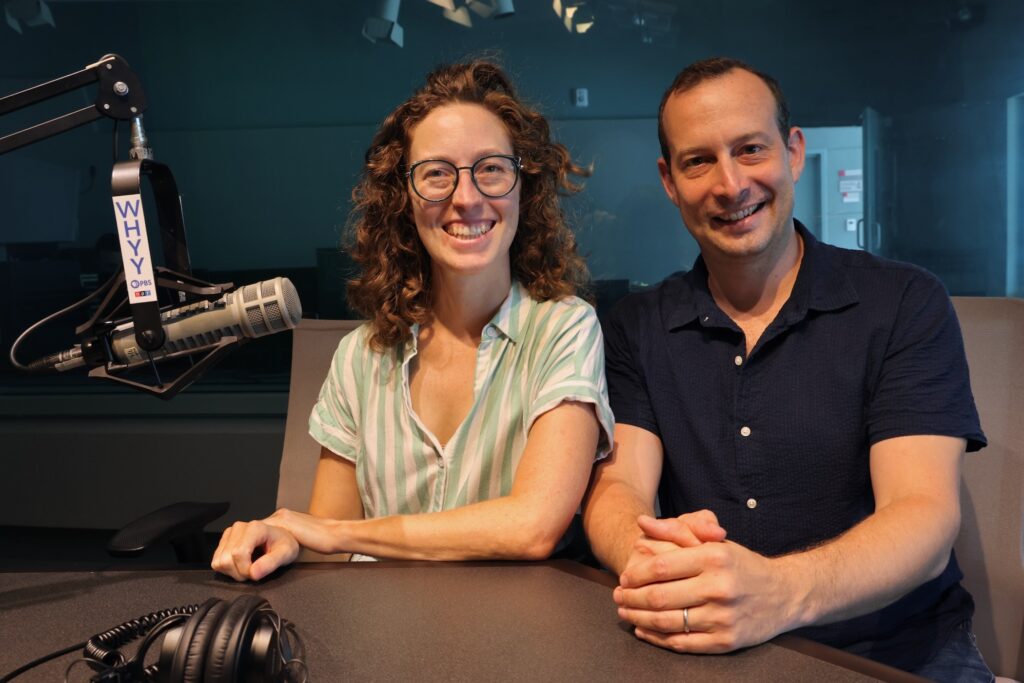
__
Jennifer Lynn: And there’s an artistic journey here. What happens in this show?
Scott Sheppard: We kind of put on certain masculine items — clothing, mustaches — as a kind of armor as we face this very intense period where we’re trying to figure out how to make sense of the way that our dads died.
This kind of moment includes lots of very difficult choices. And, you know—ventilators and breathing machines, comas…
Alice Yorke: They were both, in the last weeks of their lives, in ICU — both of them in these very tenuous situations around whether they’d recover from their ailments and injuries or whether they wouldn’t.
And so the play is sort of based on, and set in, that time period we went through — the last two or three weeks of their lives. All of the stress and decisions you have to make, and the literal things you have to go through — not only to figure out who they were, but also how to represent what they might want.
JL: Are you them?
SS: Not exactly. We like to think of ourselves as the “clerks of death.”
We’re thinking about all of the business and all of the to-do lists and all of the ways in which we kind of put ourselves to work in order to grapple with their deaths and their memories — and also to not feel things by putting ourselves to work.
AY: And I think in some ways, we are these clerks — and we are ourselves.
When you are in a situation like the ones we were in, you also sort of have to become a person: “This is my job. My job is I go to the hospital. My job is I go through these belongings. I go through these decisions.”
So no, we are not Alice and Scott. We play these clerks. But in other ways, these clerks also are Alice and Scott.
JL: And in reading a little summary about it, there’s the word “clown,” there’s “Kafka,” a couple different things. This is really very intriguing.
Okay, let’s start with clown. Are you allowed to reveal what clown means in this story?
AY: Yeah, I think clown is less like who shows up at your kid’s birthday party, but more a sense of being able to see and sometimes talk to — or interact with — the audience, and a sense of play.
We often think of plays as having what they call the “fourth wall” — this imagined wall between the audience and the actors.
And when the “clown,” in quotes, is on stage, that wall often doesn’t exist. So, the audience can be a participant. Not necessarily because we’re going to come out and make you do something, but because we see you and we want you to feel as involved in the show as we are.
JL: I’m also very curious about — and we’ll get to the Kafka part.
SS: We’ll never get to the Kafka thing. About the Kafka …
JL: Let’s get to the Kafka part.
It’s supposed to be sort of “Franz Kafka-esque” — the Czech writer, 20th century, “Metamorphosis” was one of his big things. He also wrote something called “Letter to His Father” — an actual letter to his father.
Is that how he’s woven in, or is it more of a fantastical story that we would associate with Kafka?
SS: It’s not that specific work. It’s more a kind of world where things have a very specific order — but that order doesn’t make any sense, and you feel like you’re in a bureaucratic maze that doesn’t go anywhere.
It just kind of spirals endlessly. In this case, us — when we were in this waiting period, wondering if this was going to be months of going to the hospital or just days — and feeling powerless.
JL: Yeah. There’s a lot of “powerless,” yeah. So, in this sort of bureaucratic holding pattern, do we learn about your fathers?
AY: Yeah, the audience will learn about our fathers, I think, in some explicit ways—and then also in some little ways that you might say: “Oh, I wonder if that’s from one of their dads,” or “I wonder if that’s a little piece of them.”
And then, similarly, with us — I think you’ll learn some things about myself and Scott explicitly, and then also hopefully get to see the pieces of our fathers that are in us.
Both in the joyful, exciting ways that children carry on traits of their fathers — and also in some of the more complicated or gnarly ways that you might wrestle with: “Oh God, I picked up this trait of theirs that I never liked enough.”
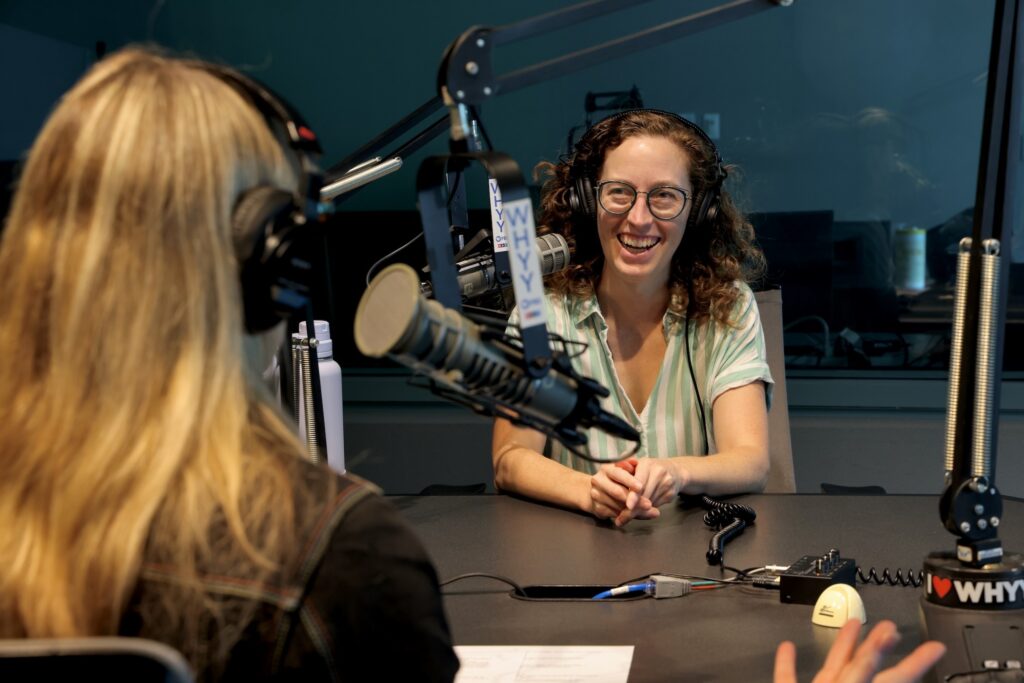
SS: We’re kind of going through all of their things — and we kind of playfully lean into the romanticism that maybe we’re going to find the one thing that makes them make sense to us.
That makes this whole thing add up. It’s endlessly the struggle to try and build a legacy — to try and make some kind of sense out of it all.
And the impossibility of that is tragic, and also it ends up drawing you closer to them as you try to figure it out — as you fail to figure it out.
JL: Do we travel through a grief journey in this play?
AY: Grief is certainly present in the play because it’s present in loss — and in the ways that our lives shift after loss.
But one of the things we’re interested in with the play is that it doesn’t focus on grief.
I do think audiences — especially audience members who’ve gone through a similar experience of loss — will recognize the ways that grief crops up in more subtle or less clear ways.
But it’s not as much about a specific journey of grief.
JL: Would your fathers have expected this from you — to somehow come together and create this? What would they think of this?
SS: I think my father might expect it a little bit, but we’ve talked about this. I don’t think he would like it.
I don’t think he would dislike it, but he was a very private person.
We’re trying to kind of, in looking at disappointments of our fathers’ lives, and their expectations and frustrations and the sad things that happened to them. I think we’re trying to offer them the humanity that they couldn’t always offer themselves.
That he still always wanted to be this image of an idealized father. I think it was really difficult for him to be vulnerable.
JL: And you, Alice?
AY: Almost the opposite. I think my dad would not have expected it.
He was a theater person — very early in his working life, he worked as a stage manager and a set designer — and always really appreciated passing along his creativity to his children.
I just picture him smiling and laughing and sort of groaning here and there if he could watch it from the back row.
JL: Well, good luck. Best of luck.
AY: Thanks for having us.
SS: Thanks.

__
The production, directed and developed by Sarah Blush, runs from Sept. 10 through 21 at the Proscenium Theatre at the Drake.
“Lions” is presented as part of the Philadelphia Fringe Festival and the Cannonball Festival.

Get daily updates from WHYY News!
WHYY is your source for fact-based, in-depth journalism and information. As a nonprofit organization, we rely on financial support from readers like you. Please give today.



